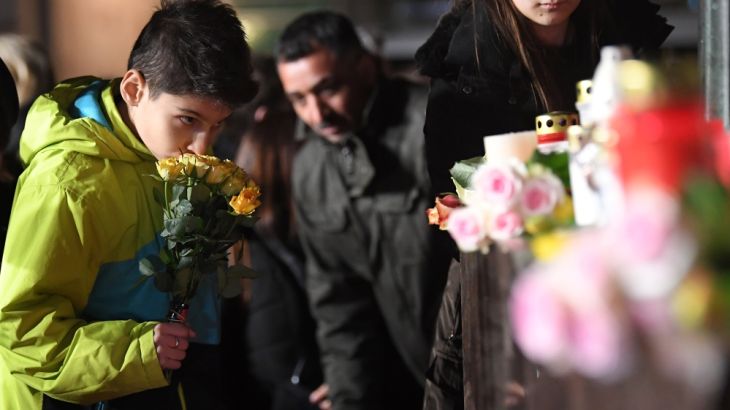‘This would be a top news story if the shooter was Muslim’
After massacre at shisha bars in Germany, critics decry media double standard in covering attacks by far-right suspects.

A deadly shooting in the German city of Hanau on Wednesday by a far-right gunman has sent shock waves around the world.
At least nine people were killed in two attacks targeting customers at shisha bars, many of whom had migrant backgrounds.
The suspect, identified as Tobias R, a 43-year-old white male, was found dead at his apartment along with his mother, according to officials.
Germany’s federal prosecutor said the suspected perpetrator’s 24-page manifesto and video messages pointed to “deeply racist views”.
Despite strong reactions from world leaders, including German Chancellor Angela Merkel, some social media users pointed out that the response to the story was somewhat muted – suggesting it would have gained more traction had the attacker been a Muslim.
This is incredibly tragic 💔💔
This would be a top news story if the shooter was Muslim.
At least eight killed in two shootings in Hanau, Germany https://t.co/x90dmu9IfL
— Zainab Mohsini (@zainabmohsini) February 20, 2020
Another white supremacist terrorist murders at least 10 in Germany, yet people won’t flinch because he didn’t shout Allahu Akbar https://t.co/EDbKyf48Zm
— Dr. Omar Suleiman (@omarsuleiman504) February 20, 2020
Others questioned why some news outlets had chosen to simply refer to the assailant as a “deranged gunman” and not a “terrorist” – or refused to describe the incident as a case of “Islamophobia”.
So a white supremacist, islamaphobe, eugenicist, incel kills mainly Kurdish Muslims in a Shisha Bar in #Hanau Germany & guess what, he’s a “deranged gunman”
No, he’s a Far Right TERRORIST
His enablers & radicalisers please note
— nazir afzal (@nazirafzal) February 20, 2020
Try imagine an attack in Germany on the Jewish community and the BBC not mention the faith of the victims or "antisemitism"?
A far right gunman (terrorist) has just attacked Shisha bars popular with Muslims. This is islamophobia and terrorism. Don't be shy BBC.— Steve Brookstein (@stevebrookstein) February 20, 2020
Hello @DailyMailUK – I can't think why this individual has been described as a gunman not a terrorist…. I just can't put my brown finger on it? pic.twitter.com/IbuNIDzAH4
— Vikas Shah MBE (@MrVikas) February 20, 2020
United States President Donald Trump, who is quick to condemn attacks by people of Muslim background, was yet to comment on the incident at the time of publication.
‘Hated non-whites’
Peter R Neumann, a professor at King’s College London, analysed the suspect’s 24-page manifesto in which he revealed that “he hated foreigners and non-whites”.
“Although he doesn’t emphasise Islam, he calls for the extermination of various countries in North Africa, Middle East and Central Asia (which all happen to be majority Muslim).”
https://twitter.com/PeterRNeumann/status/1230402281666949123?ref_src=twsrc^tfw
There have been several far-right attacks in recent years in Germany, with violence rising sharply in 2015 when the country took in more than one million migrants.
The German domestic intelligence agency estimated that the number of violent crimes with far-right elements rose by 3 percent in 2018, although attacks on centres for asylum seekers fell after a spike in 2015 and 2016.
What happened in #Hanau is not just a tragedy. It is a consequence of the normalization of right-wing extremism. Had a Muslim killed 11 people, the EU establishment – including you – would already have called it #terrorism. But when it's white terrorism it's just a tragedy? https://t.co/zCJOmyqnH2
— Srećko Horvat (@HorvatSrecko) February 20, 2020